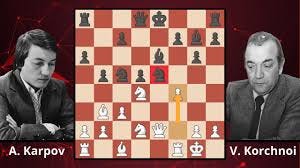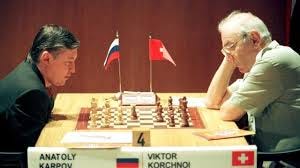There were times in my 50-year wanderings as a writer that some would suggest I’d gone far afield. Covering Karen Finley’s breast-baring performance art, for example, would be one. Tossing questions at literary heavyweights like authors John Updike, Joseph Heller, William Styron and Kurt Vonnegut at various times in various years might be another. Covering a simultaneous chess exhibition with former world champion Boris Spassky might be a third.
When it came to writing about world championship chess, some might say that was the furthest I strayed from what might be expected to be spotted under my byline. For there were times in the mid-to-late seventies and early 80’s when I found myself writing about —and actively rooting for — a nearly 50-ish Soviet defector who was as ferocious a chess player as you can be and not break the law. I never met him, of course, only read about him in the newspapers. But I liked his relentless style.
His name was Viktor Korchnoi and to me at least, he was a swashbuckling, gambit-taking, play-you-down-to-the-last-pawn sort of guy, someone who did not, under any circumstances, believe in surrender or being well-mannered. He seemed to win as often with the black pieces as white, which is not done and, as a Soviet defector, he was a one-man army against the historically powerful Soviet Chess Federation.
To do that took cojones and Viktor certainly had them, something that ran against the grain for those used to suits and ties and quiet chess clubs, tiny sandwiches in the land of eggheads and geeks. He spoke up, spoke out, he didn’t give a damn.


Like many in America, I got interested in chess when prodigy Bobby Fischer finally got his act together enough to challenge Russia’s Boris Spassky for the World Chess Championship in Reyjkavik, Iceland. Shelby Lyman put on a daily chess show on our Channel 2 in New England and strategized along with Fischer throughout each game and Bobby won!
Once I started playing chess against friends and family, it was fun, a game of strategy and anticipation and concentration. I even taught my Dad, who determinedly played me for years and years before he finally beat me. “I beat Fischer!” he said, carrying the chessboard out in the kitchen to show my Mother. She was not impressed, but he was.
In the title match vs. Spassky, Fischer acted like an ass — which was expected — but he won, which was also expected. A brilliant, once-in-a-lifetime chess mind, he certainly had shown a superior talent over the years from a young age. But he could never find a way to defeat the Soviet Chess Empire. To the Russians, chess was their baseball, something they were supremely proud of and held over the rest of the world for years and years.
When Fischer had the nerve to challenge them in international tournaments, he claimed (and was probably correct) that the Soviet grandmasters were conspiring against him, drawing games against one another to keep their scores healthy, maybe even strategizing together in adjourned positions to find ways to beat him. But this time, in 1972, he would not be beaten. Fischer defeated Spassky to earn the crown.
When it was time for Fischer to defend his title, he issued demands to change the format that the World Chess Federation refused to consider. The title was then handed to the No. 1 challenger Anatoly Karpov, a slight, robot-like, respectful toy (Korchnoi called him “a pawn” among other things) of the Soviet establishment.
So when Korchnoi had a chance to challenge Karpov for the World Title in 1978, I wanted revenge against the little wimp so you bet I was backing the irascible, chain-smoking, cursing, fuming Korchnoi when they started their match in the Phillippines in July.
Korchnoi nearly pulled it off. If you’ve ever played chess, Karpov is one of those infuriating chess players who is on defense, first, second and third. He would wait and wait and wait for you to overextend yourself, then strike. He reminded me of my friend Jeffrey’s father, Mahlon Artz, who would set up these fortresses and dare you to try to attack him. I would always try and usually, after a good two-hour battle, lose.
But this one night for some reason, I was seeing the board, anticipating his moves and countering them viciously. In the first game, I took his queen, the most powerful piece on the board, through a perfectly executed trap. He gasped as I took the piece, then shook his head. I won.
“Let’s play again,” he said quickly after the checkmate. It was after midnight but he wasn’t going to bed on a loss. Or so he thought. I beat him AGAIN, even more quickly this time. He was nonplussed. It was approaching 2 a.m., both of us with work in a few hours.
“One more,” he said. “A quick game.”
And it was. For some reason, I could not only see what he was going to do, I had a plan to nail him. I mated him in maybe 25 moves; in chess terms a first-round knockout.
“Wow,” he said, shaking his head while I saw the clock almost get to 3 O’clock. “Even Jeffrey’s never beaten me three in a row.”
When you’re seeing the board like that, it’s an amazing feeling. I was hoping for the same kind of dynamic play from Korchnoi against the nit-picking Karpov. But it didn’t happen. The champion had to win six games to defend his title. After 17 games, the match stretching through the summer, Karpov built a 4-1 lead through methodical, accurate (read boring) play.
Following the games in the New York Times, I was bummed out. There was incredible bitterness, talk of mind control and all sorts of underhanded tactics. It was hardly the most well-mannered chess contest. It was a street fight with pawns and knights and bishops and rooks.
After Karpov won game 27 - the match stretched into the fall, he was up 5-2, a win away but the scrawny little sucker was worn down. Korchnoi pounced, winning three of the next four games to tie the match! One more win would do it!
The Soviets were, of course, freaked. The highly respected referee for the match, Lothar Schmidt, immediately left town. The head of the World Chess Federation proposed a draw to the Korchnoi camp, promising“we’ll play again next year.”
Fortunately, word of that never got to Korchnoi, who undoubtedly would have let fly a string of Russian profanities that would not have needed to be translated. So they played.
Korchnoi had the black pieces, a distinct disadvantage with world class players because white has the first move. And because he saw Karpov’s weakened physical condition, not to mention wins in three of the last four games, Korchnoi pressed for a victory.
Future World Champion Garri Kasparov summed up Korchoi’s situation. “You don’t have to try to win,” he said. “Karpov will collapse because he has been collapsing. He had to play for a quiet position, maybe slightly worse, but not give Karpov a chance to win.”
Instead, Korchnoi went for it, playing an opening that he had never used against Karpov, figuring he might catch him off guard.
As Korchnoi’s second Raymond Keene explained afterwards, “It was a dumb thing to do but if you’re playing an exhausted opponent who’s run out of ideas, to give him a totally fresh field of combat is a strategic and psychological blunder.”
So, Karpov won. But I printed out the final position where Korchnoi resigned. And brought it into work the next day, along with my chess pieces and brought it over to one of the guys on the desk who was in a chess club.
“If Viktor had moved here,” I demonstrated the move which was, as far as we could see, unanswerable. “He might have won.”
“Well,” my desk guy said, “too bad you weren’t there. After playing chess just about every day from July to October, I guess he somehow missed it.”
Damn it, Viktor. Damn it all.




I watched the televised 1972 match, too. Can you imagine anything like that ever happening these days? Nice story.
In my first tournament ever, I played against a kid named Ron Henley, who went on to be a second and a trainer of Karpov in the 1990s. He beat me, by the way.
Bravo my friend! You are extraordinary in chess playing by the sounds of things! I have always loved playing myself but unfortunately, I am not big on patience at times thus often leading to my demise on the board!! ha I taught my son and grandson to play years ago and now we often have chess tournaments where my grandson kicks my butt...a lot! ha Thank God... not his dad though! If you haven't seen the movie The Queen's Gambit, I would really recommend it. Fabulous story about a little girl growing up and becoming famous for her chess playing. Although fiction it is a great psychological look at the stress put on grandmasters and takes place in the midst of the Russian - US culture war. Great story John!